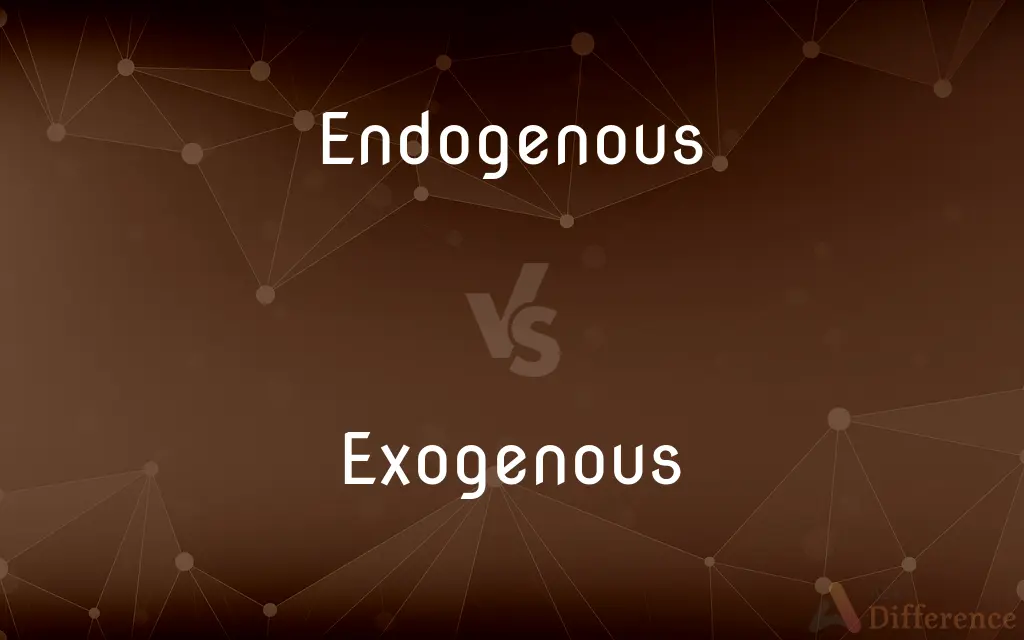Endogenous vs. Exogenous — What's the Difference?
Edited by Tayyaba Rehman — By Maham Liaqat — Updated on February 29, 2024
Endogenous refers to processes or substances originating from within an organism, cell, or system, while exogenous denotes those originating externally, influenced by factors outside the system.

Difference Between Endogenous and Exogenous
Table of Contents
ADVERTISEMENT
Key Differences
Endogenous and exogenous factors play pivotal roles across various fields, including biology, economics, and psychology, albeit with distinct origins and implications. Endogenous processes or substances are inherently generated within an organism or system, highlighting internal dynamics, such as the secretion of hormones by the human body or the internal policies of an economy that drive growth. In contrast, exogenous factors or substances come from outside the system or organism, such as environmental stimuli affecting an organism's behavior or external economic shocks impacting a nation's economy.
Endogenous factors are crucial for understanding physiological and genetic operations intrinsic to an organism's life, such as cellular metabolism or gene expression. Exogenous elements, like diet, climate, and pollutants, interact with these internal processes, potentially altering an organism's development, behavior, or health. This interplay underscores the complexity of living systems and their adaptation to external conditions.
Endogenous variables are those generated within an economic model, often influenced by the model's inherent parameters, like consumer confidence within a market. Exogenous variables, however, such as government policy changes or international trade agreements, affect the model from the outside, often serving as inputs that can significantly alter outcomes. This distinction is crucial for economic forecasting and policy analysis, where understanding internal versus external influences can guide strategic decision-making.
Endogenous factors might include an individual's mood or motivation, stemming from internal cognitive or emotional states, while exogenous factors could involve sensory stimuli or social interactions influencing one's psychological state. The differentiation helps in therapeutic settings, where treatments may target internal cognitive processes or address external environmental factors.
Endogenous factors refer to the inherent capabilities or designs within a system, like a software's built-in features, whereas exogenous factors could be user interactions or external data inputs affecting the system's operation. This distinction is vital for system design and analysis, ensuring robustness against external disruptions while optimizing internal functionality.
ADVERTISEMENT
The contrast between endogenous and exogenous is fundamental across disciplines, offering insights into how internal dynamics and external influences shape outcomes. Whether discussing biological systems, economic models, psychological states, or technological systems, recognizing the origin of factors is crucial for understanding, intervention, and innovation.
Comparison Chart
Origin
Internal to the system or organism
External to the system or organism
Examples in Biology
Hormone secretion, gene expression
Dietary nutrients, environmental toxins
Examples in Economics
Consumer confidence, technological innovation
Government policies, natural disasters
Role in Psychology
Intrinsic motivation, mood
Sensory stimuli, social interactions
Influence in Technology
Software algorithms, system design
User input, external data sources
Applications
Understanding physiological processes, internal economic dynamics
Assessing environmental impact, external economic shocks
Intervention Focus
Enhancing or modifying internal processes
Mitigating or leveraging external factors
Compare with Definitions
Endogenous
Reflecting internal conditions or policies.
An economy's endogenous factors include its workforce skills.
Exogenous
Originating externally to an organism or system.
Exogenous insulin is administered to diabetic patients.
Endogenous
Pertaining to inherent qualities or functions.
Endogenous enzymes play critical roles in metabolism.
Exogenous
Influences or substances from outside the system.
Plants absorb exogenous nutrients from the soil.
Endogenous
Generated by the system's own mechanisms.
Endogenous variables in a model predict outcomes based on internal data.
Exogenous
Stimuli influencing behavior or states from outside.
Exogenous depression can result from traumatic events.
Endogenous
Originating from within an organism or system.
Endogenous growth factors stimulate cell division.
Exogenous
External factors affecting economic models.
Exogenous shocks like oil price hikes impact global markets.
Endogenous
Internally produced substances or processes.
The body's endogenous antioxidants combat oxidative stress.
Exogenous
Data or inputs from outside a technological system.
Exogenous data in algorithms can alter software behavior.
Endogenous
Originating internally.
Exogenous
Originating externally
An exogenous model of economic growth.
Endogenous
Originating or produced within an organism, tissue, or cell
Endogenous hormones.
Exogenous
Originating or produced from outside a cell, tissue, or organism
Exogenous antioxidants.
Endogenous
Produced, originating or growing from within.
Exogenous
Having an external cause.
Endogenous
Of a natural process: caused by factors within the body.
Exogenous
(biology) Produced or originating outside of an organism.
Endogenous
Increasing by internal growth and elongation at the summit, instead of externally, and having no distinction of pith, wood, and bark, as the rattan, the palm, the cornstalk.
Exogenous
(biology) Growing as an exogen, by successive additions to the outside.
Endogenous
Originating from within; increasing by internal growth.
Exogenous
Having a cause external to the infected organism.
Exogenous
Derived from or originating outside; pertaining to, or having the character of, an exogen; - the opposite of endogenous.
Exogenous
Growing by addition to the exterior; growing by addition of a new external layer of cells on the surface just beneath the bark; - of plants.
Exogenous
Growing from previously ossified parts; - opposed to autogenous.
Exogenous
Caused by factors from outside the body, rather than from an abnormality of internal functions; - of illness.
Common Curiosities
What role do exogenous variables play in economic models?
Exogenous variables serve as external inputs that can significantly alter the outcomes of economic models and forecasts.
Can you give an example of an exogenous factor?
An exogenous factor could be a natural disaster affecting an economy or an environmental toxin impacting an organism's health.
Can technology adapt to exogenous changes?
Yes, adaptive technologies can respond to exogenous changes through updates or learning algorithms that adjust to new data inputs.
What is an endogenous process?
An endogenous process originates from within an organism, system, or model, reflecting its internal dynamics and functions.
How do endogenous factors influence health?
Endogenous factors, like genetic predispositions or metabolic rates, play significant roles in determining an individual's health.
Can psychological states be influenced by both endogenous and exogenous factors?
Yes, psychological states can be shaped by both intrinsic factors, like mood disorders, and external stimuli, such as interpersonal relationships.
How do exogenous factors affect ecosystems?
Exogenous factors such as climate change or pollution can drastically alter ecosystem dynamics, affecting biodiversity and sustainability.
What challenges do exogenous factors pose to system stability?
Exogenous factors can introduce unpredictability, requiring systems to have robust designs or contingency plans to maintain stability.
What is the significance of endogenous production in economics?
Endogenous production refers to goods and services produced within an economy, highlighting the importance of internal capabilities and innovation.
How do policy makers respond to exogenous economic shocks?
Policymakers may implement fiscal or monetary measures to mitigate the impacts of exogenous shocks and stabilize the economy.
Why is distinguishing between endogenous and exogenous important in research?
Distinguishing between these helps researchers understand causal relationships and the origin of observed effects, essential for effective interventions.
What is the difference between endogenous and exogenous growth theories?
Endogenous growth theories focus on internal factors driving economic growth, while exogenous theories attribute growth to external forces.
How can endogenous factors be manipulated for positive outcomes?
Through interventions like gene therapy or skill development programs, endogenous factors can be enhanced for health or economic growth.
How do therapists address exogenous factors in treatment?
Therapists may incorporate strategies to manage external stressors or environmental changes impacting a patient's mental health.
Are endogenous chemicals always beneficial?
Not necessarily; for example, endogenous chemicals involved in inflammation can contribute to disease if not properly regulated.
Share Your Discovery

Previous Comparison
Degree vs. Career
Next Comparison
Offering vs. SolutionAuthor Spotlight
Written by
Maham LiaqatEdited by
Tayyaba RehmanTayyaba Rehman is a distinguished writer, currently serving as a primary contributor to askdifference.com. As a researcher in semantics and etymology, Tayyaba's passion for the complexity of languages and their distinctions has found a perfect home on the platform. Tayyaba delves into the intricacies of language, distinguishing between commonly confused words and phrases, thereby providing clarity for readers worldwide.














































